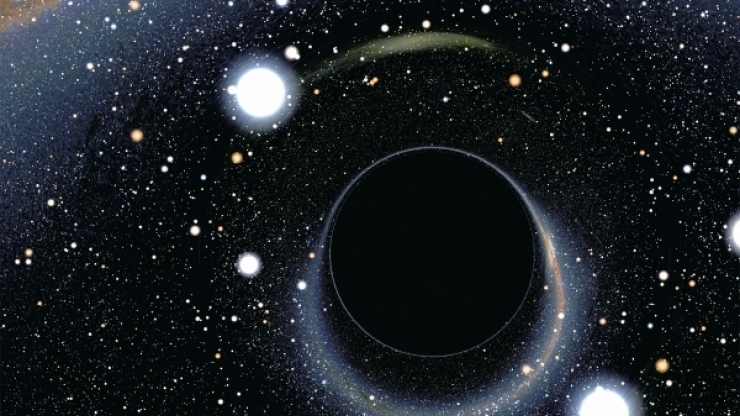Where did you go, black holes?
There’s still not even one convincing proof that the fearsome cosmic objects lurk somewhere in the dark
Black holes – how can you not love them? These extremely powerful things engulf everything that crosses their way. Nothing ever comes out, where, fortunately, we are. They've become a part of our everyday conversation topics, we know that one enormous black hole is lurking from the center of our galactic… It turns out, however, that things aren't that simple. That this idea we all accept as a fact might be far from the truth. This has been proven by the research of Assoc. Prof. Plamen Fiziev, well known to the readers of Magazine 8 for his theories about the origin of the universe and the so called "God particle"-Higgs boson.
The scientific attitude towards black holes, according to Assoc. Prof. Fiziev, could be compared to something slightly different – the discovery of America. Have you ever wondered why the continent beyond the Atlantic ocean isn't called Christophoria? Yes, we all know why – Columbus didn't know what he has found. As a well educated man he wanted to use the fact that the Earth is round and one could travel from Europe to India, heading North. In other words, he used non-Euclidean geometry, based on the seemingly odd idea that two parallel lines intersect at infinity. Columbus made the calculations, organized an expedition and found something, which he misrecognized as India. Even today we still call the native people "Indians", although none of them have ever set foot on an Asian country.
The truth was found by the humble cartographer Américo Vespucio after hard work and two expeditions. He was the first to find out that there's something bigger – a whole new continent, even two – North and South America.
You need to see them
Is there a chance that this story repeats itself again, this time with the black holes? And the thing we all imagine might be something entirely different? Could some physicist take Vespucio's part and explain things more serious? These are the questions that Assoc. Prof. Fiziev has been asking himself. It turns out that the big names in the world of physics today don't take the answers as the absolute truth.
As a matter of fact, the term we use in our everyday conversations is created in 1967 by the famous physicist, John Wheeler.
Back then, the objects were called "collapsed stars" and Wheeler uses the word to introduce the idea of an area in space and time, that nothing comes out of, not even the light. His experience and great authority in the U.S.A., where he used to lead the projects for nuclear and hydrogen bombs, were of great importance for the term to establish. "In this case we're not talking about a science, but abound a real propaganda campaign", assures Assoc. Prof. Fiziev. According to Matt Visser, a well-known expert on gravitational theory, the innocent question of the black holes' existence in nature is much more complicated, and the media, as well as the leading scientists tend to simplify it without justification.
The idea of the black holes' existence, exactly like in the case of Columbus discovering America, is a result of the non-Euclidean geometry. The root of this idea is Einstein's relativity theory.
As for the black holes, it is very important whom you'd ask, explains Assoc. Prof. Fiziev. They exist for the experts on mathematics and physics – and conveniently solve many of the equations. The black holes are closed little areas in the space and time, that don't interact with other object. They're separated from them by a boundary called "event horizon", which lets physical signals and objects in and doesn't let them get out. We still don't know what happens on the inside, because nothings ever comes out to tell us anyway.
According to Assoc. Prof. Fiziev, the mathematicians are the ones we shouldn't trust too much. Very often the answers of their equations lack any real meaning – and we can say the same thing about our lovable monsters.
Eye to eye
If you ask a theoretical physicist like Assoc. Prof. Fiziev, however, the question of the black holes won't be that easy. He thinks that the term itself hides many controversions and theoretical difficulties. Something more – the existence of such objects contradicts with many of the established laws of physics.
The arbiters in this case are the astronomers – have we really seen something that could hint us the right answer? It turns out, unfortunately, that even here doesn't exist any indisputable proof that the distant observed things really meet the mathematicians' expectations. The astronomers observe hundreds of little dark compact object with unusual for their size masses and strong gravitational fields. The question is, what are they indeed? More and more physicists simply call them "black hole-candidates".



